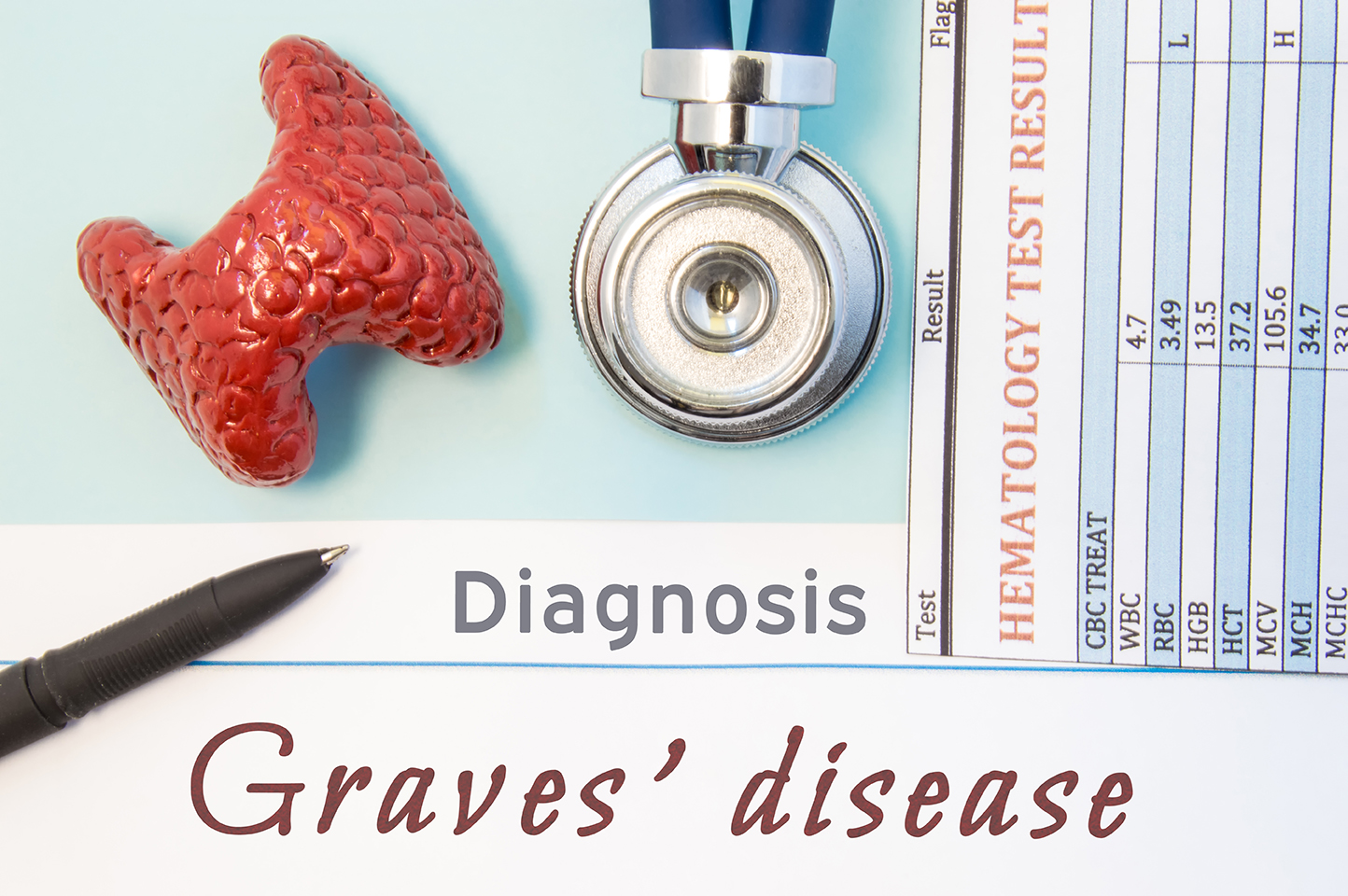Bulging eyes, insomnia, rapid heartbeat, and a host of other painful symptoms make Graves’ disease a tough autoimmune thyroid disease to manage lifelong. As a thyroid disease, Graves’ disease leads to hyperthyroidism as against Hashimoto’s thyroiditis which leads to an underactive thyroid. It is a condition that can be managed successfully if one follows the treatment and reduces symptoms of overactive thyroid.
What is Graves’ disease?
Graves’ disease is a thyroid disease that causes hyperthyroidism and enlarged thyroid glands. It is a condition in which the immune system of the body starts to attack certain cells and enzymes of thyroid glands leading to excessive production of the thyroid hormone, thyroxine.
Graves’ disease is more common in women when compared to men. Due to the excessive production of thyroxine hormone, there is an increase in the metabolic rate, and a change in the appearance of the affected person with orbitopathy, an abnormal bulging of eyes caused due to Graves’ ophthalmopathy.
In Graves’ disease, due to the presence of thyroid autoantibodies, there are enlarged thyroid glands with goiter, and increased production of thyroxine. Thyrotropin receptor antibodies are known to directly lead to hyperthyroidism.
In this condition, the thyroid glands are forced to produce more thyroxine due to the continuous circulation of thyroid autoantibodies against thyrotropin receptor. This leads to more iodine absorption in the body, more protein synthesis, and enlarged thyroid glands.
Complications of Graves’ disease
Unmanaged and untreated Graves’ disease leads to several risks. It leads to a condition called severe thyrotoxicosis or thyroid storm, which is a life-threatening condition. Untreated Graves’ disease also causes cardiovascular diseases, cognitive complications, skin issues, and Graves’ ophthalmopathy.
Prolonged high levels of thyroid hormone in the body is known to cause menopause, osteoporosis, and anovulation. Prolonged overactive thyroid or hyperthyroidism causes:
- Bone loss
- Muscle breakdown
- Chronic anovulation
- Heart rhythm disorders
- Atrial fibrillation
- Cardiomyopathy
- Congestive heart failure
- Anxiety disorders
- Weight loss
Being an autoimmune thyroid disease, Graves’ disease leads the immune system to create antibodies called as thyroid-stimulating immunoglobulins. These thyroid-stimulating immunoglobulins attach themselves to thyroid cell receptors and cause excessive thyroid production and enlarged thyroid glands. However, the symptoms of this condition can take some time to manifest. Often, they might be misinterpreted and misdiagnosed. This condition is treated by endocrinologists.
Symptoms of Graves’ disease
- Unexplained weight loss
- Anxiety
- Sleeplessness
- Tremors in hands
- Irregular menstrual cycles
- Weakness of muscles
- Faster heartbeat
- Enlarged thyroid
- Sensitivity to light or double vision
- Heat intolerance
Apart from these symptoms, some people with Graves’ disease might also experience high blood pressure, chest pain, and shortness of breath.
Graves’ disease diagnosis
Graves’ disease is more common among people with other autoimmune diseases like type 1 diabetes. It is diagnosed by:
- Physical examination
- Thyroid function test with levels of TSH, T3, & T4
- Thyroid-stimulating immunoglobulin levels
- Thyroid peroxidase antibody test
- Radioactive iodine uptake scan
- CT-scan
- MRI
- Thyroid ultrasound
Graves’ disease treatment
Graves’ disease is a condition that can be treated and managed well by endocrinologists. This is done by regulating the levels of thyroid hormone levels by various means. Treatment options for Graves’ disease include:
- Antithyroid medications
- Radioactive iodine therapy
- Surgery with thyroidectomy
Apart from these, other medications like beta blockers are prescribed to patients with Graves’ disease in order to regularize heartbeats.
Most patients respond well to the treatment; however, there is a chance of relapse in patients Graves’ ophthalmoscopy and people who smoke. People with more enlarged thyroid with goiters are also known to have a relapse.
When it comes to the treatment options, antithyroid medications can cause side effects like:
- Rashes
- Hives
- Headache
- Heartburn
- Muscle pains
- Gastrointestinal problems
- In rare cases, liver toxicity
In case of radioactive iodine therapy, patients have to take numerous precautions. Radioactive iodine therapy is provided orally. In this therapy, radioactive iodine destroys thyroid gland cells and reduces the production of thyroid hormones. However, people who undergo radioactive iodine therapy need to take precautions like washing hands regularly, avoid close contacts with infants, children, and pregnant women, and flush toilets at least twice. Moreover, women planning pregnancy are not advised this therapy.
In the case of thyroidectomy, this treatment is advised by endocrinologists when the patient is unable to bear the side effects of antithyroid medications or radioactive iodine therapy. Thyroidectomy provides rapid resolution of Graves’ disease and is generally advised for patients with a moderate degree of Graves’ ophthalmopathy, and thyromegaly (enlarged thyroid) that causes obstruction and creates difficulty swallowing. Thyroidectomy is partial or total.












